 |
 |





 |
 |
 |
 |
 |
 |
Up to 163 projects could be delayed in 2003-2012 program
|
 |
 |
 |
With Hwy 100 in Golden
Valley as a backdrop, Commissioner Elwyn Tinklenberg announced on June
11 that Mn/DOT may be forced to stop or delay 163 projects during the
next decade because of projected funding shortfalls. Photo by Craig
Wilkins
|
Hwy 2 reconstruction through Grand Rapids, expansion of Hwy 14 between Owatonna
and Dodge Center, and replacement of the Cayuga bridge in the Twin Cities are
just three of the 163 projects that Mn/DOT may be forced to drop or delay because
of projected funding shortfalls during the next decade.
Commissioner Elwyn Tinklenberg made the announcement at a news conference at
Metro Division’s Golden Valley office on Tuesday.
"Transportation investments have lagged for 15 years and no new funding
again in 2002 means project estimates, schedules and commitments must change,"
he said. "It is our obligation to clarify for the public, elected officials
and local governments what we can and cannot accomplish with the dollars we
have."
The projects, valued at $1.6 billion, had been scheduled to begin between 2003
and 2012. The list, which is not yet final, includes:
-
43 projects in Duluth/District 1
-
7 in Bemidji/District 2
-
17 in Brainerd/District 3
-
12 in Detroit Lakes/District 4
-
36 in Rochester/District 6
-
17 in Mankato/District 7
-
7 in Willmar/District 8
-
24 in Metro Division
The projects identified are being delayed an average of three years, which
could cost the state $360 million due to inflation. There also will be an increased
cost to purchase land for new and expanded right of way, Tinklenberg said.
Tinklenberg said the deferrals are based on criteria that put safety and structural
needs ahead of system improvements and expansion projects.
"We emphasized investments that preserve and manage the system—those projects
needed to take care of existing highways and bridges—ahead of expanding or replacing
the system," he said. "Prioritizing our investments resulted in delaying
several of our major construction projects designed to add lanes on rural highways
and increase capacity on Twin Cities freeways."
Project deferrals don’t mean layoffs
In an e-mail the commissioner sent June 11, Tinklenberg thanked all employees
for keeping Mn/DOT’s "maintenance operations progressing while delivering
the largest construction program in history as a result of the one-time 2000
allocation."
He also addressed employees’ concerns that the project deferrals could potentially
cause layoffs.
"The project deferrals will be spread out over a 10-year period and should
not affect anyone's current job," he said. "Internal and external
forces have required that we be more flexible, accountable and responsible for
doing more with the resources we have.
"In some cases, people may be asked to do different work or even different
jobs in order to create the most benefit for our customers. But Mn/DOT still
needs every skilled, qualified employee to deliver the biggest construction
program in the history of the state," Tinklenberg said.
For more information and to read the June 11 news conference materials, click
on http://ihub/information/tools2002.html.
Click here to read what
the news media are reporting.
|
back

|
 |
Crews respond with energy, determination to combat heavy floods
|
 |
 |
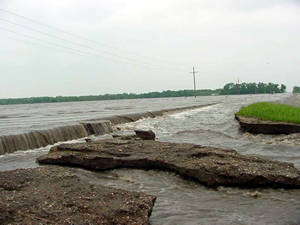 |
Floodwaters
run over Hwy 9 about three miles south of Ada. Photo
by Scott Theisen
|
Torrential rains that dropped as much as 20 inches of rainfall in a few hours
Monday flooded highways and forced road closings throughout north and north-central
Minnesota, sending Mn/DOT maintenance forces into a familiar flood response
pattern.
Maintenance crews hauled sand and gravel to repair washed out shoulders, cleared
debris from bridges, built earthen dikes and detoured traffic from flooded highways
onto alternate routes in areas such as Ada, Mahnomen, Warroad, Baudette and
Roseau.
Floods required closing more than a dozen highways, including Hwy 9 at Ada,
Hwy 200 between Mahnomen and Hwy 32, Hwy 11 between Baudette and Warroad and
Hwys 11 and 89 in Roseau. Other roads, such as Hwy 72 south of Baudette, are
water-covered but still open. Mudslides along Hwy 11 near Baudette could worsen
if the area receives more rain.
Dennis Redig, maintenance superintendent at Detroit Lakes, said receding floodwaters
and the hard work of Mn/DOT people, other agencies and volunteers have restored
highway use in most of the previously flooded areas.
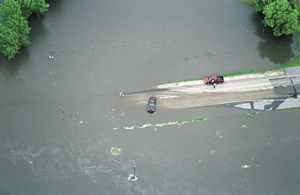 |
|
Hwy
200 just west of Ada was under water and closed when this photo was taken
on Monday, June 10. Photo by Bruce Crummy/The Forum
|
Crews, he said, have repaired a bridge on Hwy 32 near Ulen and replaced washed
out shoulders on the road as well. Other repair work was done on Hwy 59 near
Waubun and near Bejou and on Hwy 113.
Flooding in some areas in the Bemidji District may exceed the levels experienced
during the devastating floods of 1997, said Terry Sorenson, maintenance supervisor
at Crookston.
"In the way of damage, this looks worse than we had in 1997," he
said.
Damage to the region is higher, Sorenson said, because farmers have their crops
planted—unlike during the early spring floods of 1997—and clean-up efforts take
longer because trees and other debris are wet, dirt-covered and heavy.
Sorenson said there is still debris wedged under the Hwy 9 bridge over the
Wild Rice River after crews removed what they could reach with backhoes and
loaders.
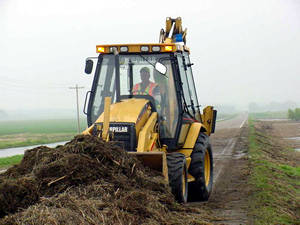 |
|
Cliff
Schulz, Ada, uses a backhoe to add material on the shoulder
of Hwy 32 to prevent further damage from flooding.
Photo by Scott Theisen
|
Debris carried by the swollen river knocked out approach panels on the bridge,
Sorenson said. Other damage includes shoulder washouts, broken culverts and
scouring of bridge piers by rushing water the debris it carries. County roads
in the region have suffered extensive damage. Motorists are advised not to use
any Lake of the Woods County roads and roads in the eastern part of Roseau County
because of the flooding.
Dave Dalager, Crookston maintenance superintendent, said waters receding from
the Ada area and other locations enable the district to focus on severe flooding
at Roseau.
The Roseau Truck Station was built higher above ground than standard, Dalager
said, allowing the station to stay dry and functioning during the flood. Crews
there are helping to build dikes on the roads and assisting emergency response
crews and their vehicles to get through flooded areas. Current efforts are now
directed to prevent extensive damage to Polaris, Inc., the city’s largest employer.
Dalager said severe flooding has become "way too frequent" in recent
years, but he said Mn/DOT people remain ready to serve any way they can.
"Any time they need help, we’ll respond with the people and the equipment
that we have on hand," he said.
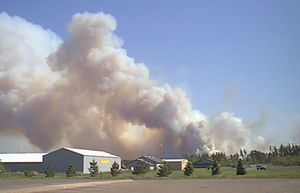 |
|
A pall of smoke from
a wildfire rises near the Brainerd District headquarters in Baxter. Photo
by Eleanor Quarry
|
Fire plagues Mn/DOT crews, too
Floods are not the only natural phenomenon to bedevil Mn/DOT employees. During
the Memorial Day weekend, a wildfire thought to have been caused by illegal
use of fireworks burned hundreds of acres of forest near Brainerd. The fire
forced closing of Hwy 371 at the start of the weekend, requiring that Mn/DOT
people from the Brainerd District and other officials detour traffic onto Hwy
169. Smoke from the fire was visible from the district headquarters at Baxter.
By Craig Wilkins
|
Quick response rescues
driver on flooded Hwy 9
Terry Sorenson saw the white Chevy Blazer drive off the edge of water-covered
Hwy 9 and end up dangling over a wash out on the flooded roadway.
Sorenson, maintenance supervisor at Crookston, radioed to sign crew
members Domingo Aguilar and Roberto Ibarra following behind in a Class
33 truck. Aguilar and Ibarra pulled their truck in by the Blazer and
used the platform added to the truck for sign work to reach the driver
and pull him to safety. A State Patrol officer who heard the radio call
aided them.
Sorenson called a tow truck to pull out the sport utility vehicle,
which had water up to the seats.
The driver, an elderly man, was "pretty cool" about his misadventure,
Sorenson said.
"The timing to help the guy was perfect," Sorenson said.
"I saw him go in and Domingo and Roberto were right there to get
him out."
|
|
back

|
 |
New phone number broadens Shaping Our Future communications channels
|
 |
 |
Have a question about Shaping Our Future and other changes that are occurring
in Mn/DOT? Now you can use the phone, as well as other methods, to get information
about the initiative and how it will affect you.
In addition to calling 1-888/749-8155, you may get Shaping Our Future information
by:
-
Talking to your manager or supervisor
-
Reading Mn/DOT Newsline weekly
-
Reading informational posters and handouts
-
Attending a "Discussions with Dick Stehr" session; the next one
is scheduled for June 24, 1:30 to 2:30, in the Central Office cafeteria
-
Checking Mn/DOT’s intranet site: http://ihub/shaping/
You may also send questions to change@dot.state.mn.us
or Change, Mail Stop 150.
|
back

|
 |
CO motor pool’s gas-electric powered Toyota ‘hybrid’ offers high mileage, low
emissions
|
 |
 |
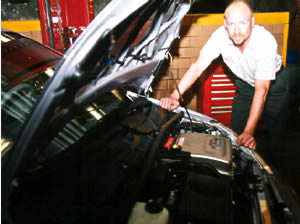 |
Mark Fisher, CO motor
pool mechanic, familiarizes himself with the operation of the new "hybrid"
Toyota Prius that uses a 1.5-liter gas engine augmented by an electric
motor to increase fuel economy and reduce exhaust emissions. Photo
by Craig Wilkins
|
Central Office motor pool users may now choose to drive a new "hybrid"
Toyota that combines an internal combustion engine with an electric motor to
create a more fuel-efficient, environmentally friendly vehicle.
The Toyota, known as the Prius, uses a 1.5-liter gas engine augmented by an
electric motor for motive power. The Prius resembles the Honda Insight, which
also combines a gas engine with electric power.
In the Prius, drivers start the car with a switch that starts the gas engine
motor for initial acceleration. If more power is needed, the car’s electric
motor engages.
The Prius’ unique operating system also converts mechanical energy released
during braking into electrical energy to recharge the electric motor’s batteries.
The Prius actually gets better gas mileage in city driving because energy created
from braking increases the power available to the electric motor, which reduces
the power required from the gas engine.
The vehicle uses lightweight, zinc-oxide batteries mounted in the trunk.
Fleets of Prius vehicles are now in use nationally by public and private agencies
wanting to reduce fuel costs and emissions and for extensive road testing to
determine their effectiveness and reliability.
In Minnesota, the state Pollution Control Agency operates two Prius vehicles
and a pair of the two-passenger Honda Insights. Honda recently introduced a
gas-electric hybrid option in its popular Civic models and Ford is developing
a similar power system for its Escape SUV.
Tom Tufenk, motor pool supervisor, said the Prius was chosen to offer drivers
a more fuel-efficient option to its standard cars.
"So far it’s been worth it," he said. "On its first tankful,
the Prius got 47 miles per gallon."
By Craig Wilkins
|
back

|
 |
Norwegian highway leaders visit Minnesota to learn new technical, business approaches
|
 |
 |
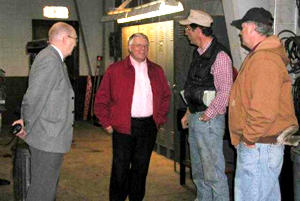 |
During the Norwegians’
visit to the Two Harbors Truck Station, Olav Softeland, director general
of the NPRA (left), met with (from left) Wes Gjovik, Bemidji district
engineer, and Wally Wolfe and Ron Goette, transportation generalists at
Two Harbors. Photo by Maureen Talarico
|
Leaders from the Norwegian Public Roads Administration visited Minnesota and
met with Mn/DOT officials to learn about intelligent transportation system advances
and determine how they might apply structural changes under way at the department
to a major revamping of their own agency.
The delegation toured the Traffic Management Center in Minneapolis and visited
the Duluth District to see the new Transportation Operations and Communications
Center, the district headquarters and the truck station at Two Harbors.
During their time in St. Paul, the officials also heard how Mn/DOT is implementing
its Moving Minnesota and Shaping Our Future strategies to use its resources
more effectively to meet the state’s changing transportation needs. The Norwegian
officials received briefings from Kevin Gray, chief financial officer; Marthand
Nookala, assistant director, Program Support Group, and Doug Weizshaar, deputy
commissioner and chief engineer.
Kjell Levik, director of road technology with the NRPA, said the forthcoming
change is a "revolutionary" one for Norway. He said, however, that
expertise gained from Mn/DOT will help guide their organization’s change since
the exchange of technological information has benefited the agency in the past.
The NRPA will divide into two agencies—one that will act as a purchaser of
services and one that will serve as a provider of services such as highway planning,
design and construction. The agency that will provide services will become a
state-owned company and compete with the private sector for services that NRPA
will need.
The visit by the NRPA officials represents the continuing exchange of information
and expertise among officials from Norway, Finland, Sweden, Russia and others
with Mn/DOT managers and staff.
The Norwegians also visited research and manufacturing facilities at 3M and
ADDCO to help determine how their products and services can improve traffic
capacity and safety in Norway.
By Craig Wilkins
|
back

|
 |
Rochester appoints Kirsch as ADE for state aid and structures
|
 |
 |
 |
Steve Kirsch will become
Rochester/District 6's new assistant district engineer for state aid and
structures on June 19.
|
Steve Kirsch, structures engineer with Rochester/District 6, was named as the
district’s assistant district engineer for state aid and structures. His appointment
begins June 19.
In his new position, Kirsch will manage the district’s state aid functions
as well as bridge maintenance and construction.
Kirsch held his current position with the district since 1991. During his tenure,
Kirsch worked closely with the cities and counties in the district and developed
partnership agreements for bridge inspection services with many of them.
Before joining Mn/DOT, Kirsch worked in detail and bridge design with a private
consulting firm.
Kirsch succeeds Greg Paulson, who was appointed as district engineer in February.
A native of Two Harbors, Kirsch holds a bachelor’s degree in civil engineering
from North Dakota State University.
|
back

|
 |
Dates set for Camp Mn/DOT
|
 |
 |
 |
Camp Mn/DOT will be
held in various locations around the state during the week of July 23.
Graphic by Jane Greiner
|
Several districts and Central Office are gearing up for the annual invasion
of kids at Camp Mn/DOT during the week of July 23. Events vary by location but
all will focus on transportation in Minnesota.
Last year, almost 400 children, ages 4 and older, participated in the one-day
camp.
Below is a list of participating districts, dates and registration contacts:
Baxter/St. Cloud
Tuesday, July 23
Ages 4 through16
Registration: Lisa Zablocki, Baxter; Vickie Paul, St. Cloud
Central Office
Thursday, July 25
Ages 4 through 16
Registration: Nancy Worline, MS 240
Duluth/Virginia
Duluth Tuesday, July 25
Virginia, July 23
Ages 9 through 17
Registration: Cindy Syria or Jennifer Stevens, Duluth
Detroit Lakes/Morris
Detroit Lakes Tuesday, July 23
Morris Thursday July 25
Ages 5 through 12
Registration: Shirley Rislund, Detroit Lakes; Marleen Anderson, Morris
Metro Division
Wednesday, July 24
Ages 6 through 12
Registration: Amy Listner, Waters Edge Roseville
Rochester/Owatonna
Thursday, July 25
Ages 6 through 18
Registration: Deb Swenson, Rochester
Click here to read about last year’s Camp
Mn/DOT events.
|
back

|
|
 |
|



